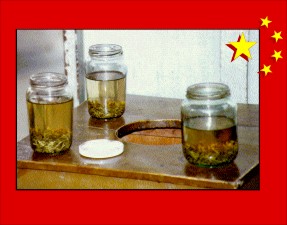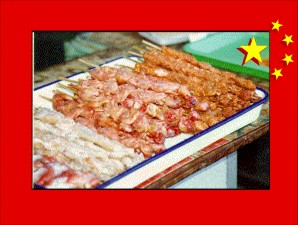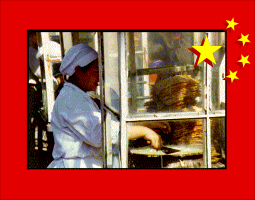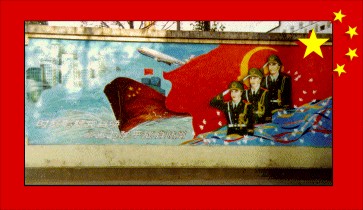
Marcel is an Astro-physics student at Cal Tech (his father and grandfather are physicists) and he had been traveling around China for nearly two months with a grant he was awarded. The grant was primarily for travel in China but he had also had to present an area of study that he wanted to accomplish while here. It didn't have to be academic oriented he said, and gave us examples of a man interested in beer brewing and a women interested in flowers who also had been awarded this grant. He wanted to learn about ancient Chinese astronomy which was inseparable from ancient Chinese astrology, but interested him because it showed that they were observing and mapping the skies long before many in the West had realized. Like me, his Chinese ability was rudimentary though perhaps strengthened by his two months stay and he said that the travelling by himself had been difficult at times because he had no one to express his frustrations to as he went. On the other hand, it seems he met a few people both Chinese and foreign tourists that he may not have met if he were travelling with someone.


A visit to China would remind any American how much our filtered water is taken for granted. A jar of tea is probably the most ubiquitous sight in China. It is a Chinese person's drinking water, Coke, or any of the other myriad drinks available to Americans all in one and is drunk either warm or cold.

 skewered sparrows prepared for cooking
skewered sparrows prepared for cooking
Some people say that communication and transportation have made the world smaller. I would illustrate this by positing that American mass culture and Chinese food can be found almost anywhere in the world. We have visited places where t-shirts are printed with American commercial slogans or sports team names where it is also very, very difficult to find that same country's national language on t-shirts. American music and television are also found most any place with a television set and a radio. In the same way, any country that has even a rare "foreign food" restaurant is likely to have a Chinese food restaurant though this is likely to be the limit of many peoples' exposure to anything resembling Chinese culture. Here are a few of our scattered experiences with Chinese food in China:

During that sightseeing stroll in Shanghai I talked about earlier, I saw several markets where among the items for sale were multiple varieties of tea, live fowl, including pigeons presumably for sale as food, skewers of meat being cooked from the back of customized bicycles that had either a frying pan mounted to the bike or a small barbecue. One morning, Karen and I stopped at an alleyway along a main street and had two bowls of seasoned noodles and a bowl of wonton noodle soup for Y6 ($.75) for our breakfast. It was an unappetizing setting, but the noodles were excellent and we were too full to eat all the soup. What's especially nice about the noodles we've eaten in Shanghai and Nanjing is that you can watch them being made from scratch-even though this may also mean you're often seeing them make the noodles in the not-especially sanitary conditions, a table located on the side of the street. In Beijing we were treated to another form of breakfast. First batter was poured and spread onto a hot plate just as a crepe is. A couple of eggs are broken and scrambled on top of the cooking batter. A chili pepper paste, some kind of brown sauce, onions and a herb are added before a light square, fried bread finishes the creation and the entire meal is folded several times before given to you. Again it was a delicious meal for Y1.50 to which I added a canned soda for Y4.

Chinese people seem to revere eggs somewhat more than other cultures. When we were in Hong Kong I noticed that McDonald's stopped selling breakfast in the late morning just as any McDonald's does anywhere in the world, but they continued selling Egg McMuffins throughout the day. We went to a Kentucky Fried Chicken restaurant in Shanghai where they deviated from the menu served in America in two noticeable ways: they didn't serve corn and they sold brown eggs as part of some meals. While in Nanjing we began to suspect another aspect of Chinese culinary culture which we first noticed in Hong Kong. We observed that principal dishes of meat or vegetables are often present one at a time with the soup and rice being set on the table at the end.

For dinner one evening we had three dishes of food, meat and vegetable dishes, four bowls of rice (small Chinese style bowls), a bowl of vegetable soup that could have fed at least six people by itself, all the tea we could drink, and two Cokes for Y70 (US$8.64). This would have been a feat in itself, but this was the second such meal we had in Nanjing and they both compared with the best Chinese meals we've ever had in the U.S. and in Europe. In Beijing we were attracted to a storefront sign that had some English stating "CLEAN ENGLISH MENU" so we gave it a try and were pleasantly rewarded with a menu that offered the variety of a restaurant ten-times its size and was delicious as well. We've had our share of poor tasting Chinese meals in the brief time we were in China as well. One day we went to a restaurant for lunch that looked nice and had pictures of dishes so we could just point. Our meal didn't look much like the picture, we were given glasses of tea that were only refilled once, and the service was terrible. The meat portion of our dishes was so bad that when we saw a glass case with several snakes in it we speculated that we might have eaten snake even if it was unlikely.
In Beijing we saw street vendors selling barbecued skewers of fried sparrows but didn't work up the courage to try them. We ate at a restaurant that was affiliated with the hotel we were staying at which "specialized in Cantonese cuisine" and was the "only designated restaurant approved by Beijing wild Animals Conservation Association." I had difficulty ordering from a menu which consisted generally of such items as these: roasted piglets, stewed tortoise, spiced pigeon, mini-special dog meat dish, pigfoot [sic] in bean sauce, three snaker [snake] stewed with tortoise, spiwach [sic] with bragrant [sic] snake slice, roasted rat meat, roasted cat meat, cuntry [sic] chicken, snake head ball in oil, snake head ball with gree [sic] vegetable, snail , and razor. In all fairness though we had some delicious fried rice and soy bean curd, and the service was very good.

When in Beijing you might as well eat Beijing Duck right? We tried this culinary experience at "one of the oldest restaurants in the capital, dating back to 1864." It is served boneless and sliced with crepes, plum sauce, and onions just as mushu pork is at any restaurant in the United States. We also got a bowl of soup that we could only guess was melted duck fat. The duck meal itself was okay, but probably due to my own ignorance I thought Beijing Duck was prepared so that air was pumped in between the skin and meat so that when it was cooked the fat would melt and help flavor the duck. Not so at the "Big Duck" (nickname for the establishment we visited) because half of the slices of duck we were given were mostly duck fat still attached to the skin.
Before we had arrived in Beijing, our companion in a train car advised us that a stop we were at somewhere in Shandong was the location for a town that had a reputation for their chicken. I got off the train with him and bought a vacuum packed, precooked chicken for Y15. Before I opened the bag, I thought I saw a duck's bill in the package and assumed that our companion just got the English words mixed up. Karen and I ate the bird from the bag and it was absolutely delicious just as our friend had said, he was saving his until he got home. I lost my appetite though when I saw the bird's claws and realized that I might start picking parts of the bird out of the package that I wasn't used to eating.

Sometimes we were uncomfortable eating at restaurants in China because the employees would stare at us and seem so concerned with our welfare that we felt obliged to leave a good impression so that they will save face. We were sure that this extra attention derived from the fact that I was an unusual sight in China having blond hair and blue eyes.
Karen and I were having a disagreement at our table at a restaurant and a group of men at the table next to us kept staring. I was annoyed by the intrusion even though I was in a public place and loosing my patience said, "lai, lai" (come, come[join us]). They motioned that they were going to stay at their table and the extent of their staring subsided. After a short while you learn, or think you do, which sort of people think of you as an oddity because you are a foreigner. On another occasion I got frustrated with a man staring because he wouldn't stop even if I stared back for several seconds. Finally I said, "ni yao shenme?" ("what do you want?"). He hadn't been embarrassed in the slightest way until I said this, but after I spoke up he muttered something to the extent that he didn't want anything and looked away. Although people would often run away when they saw me take out a camera or our video camera a few times people would take pictures of me surreptitiously. One time a soldier asked me to take a picture with him and a couple of other Chinese people joined in the picture so that there were three or four cameras clicking at once. In this way it was a quite a surreal experience.


I've seen either soldiers or uniformed policemen cleaning trash from alongside the train tracks near Shanghai's main train station and shoveling mud and dirt at Nanjing's main train station. The latter was a group of some thirty men who labored in dress uniforms with matching dress caps, it was an odd site.

